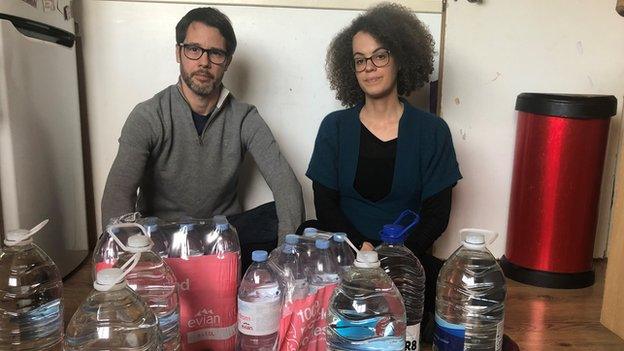High levels of lead found in Herne Hill flats' water supply
- Published

Ben Archard and his wife Emmanuelle say they have spent about £2,000 on bottled water over the years
Residents of an estate in south London say they are "scared" and relying on bottled water after high levels of lead were found in the water supply.
Tenants of Dorchester Court, a private estate of about 100 flats, have been advised not to drink their tap water while further testing is carried out.
Lead can cause serious poisoning if it builds up in the body.
The estate's management company says it is working with the local authority to investigate the scale of the problem.
'Extreme risks'
Environmental Health officers from Lambeth Council recently organised tests on the supply at the estate in Herne Hill after concerns were raised by residents. The water at two of four flats tested was found to contain levels higher the legal limit of 10 mcg per litre.
"Living with the possibility of lead poisoning is scary," leaseholder Ben Archard said. "The risks are extreme."
Mr Archard and his wife Emmanuelle found out several years ago their pipes were lead ones. They have been buying bottled water since as a precaution, to protect the health of their two children, aged two and four.
Babies and young children are most at risk from exposure to lead, as their development can be affected.
Emmanuelle said she was "stressed and scared". She added that they have to plan their lives around maintaining stocks of bottled water, which she said had been a financial strain.
"We calculated we have spent over £2,000 in the last few years. That could have been a family holiday or a new kitchen," she said.
Lambeth Council says it is working with the water supplier, Thames Water, to test the water in all the properties on the estate. Property Partners, which manages the flats, said bottled water was being supplied to all residents while tests are carried out.
'Expensive' problem
Since 1970, the use of lead in water pipes has been banned, due to its potential for dissolving into the water and causing poisoning.
However, it is estimated that about eight million buildings in the UK, mostly homes, still have lead pipes, because the owners have not replaced them.
Some underground service pipes, owned by water suppliers, are also made of lead.
Prof Vanessa Speight, an expert in civil engineering and water quality, said replacing pipes had proved "difficult".
"It's an expensive problem. It's one the water industry has committed to really trying to tackle over the next 20 or 30 years. It's tricky, because we know what to do, but it's complicated, it's disruptive and it's expensive," she said.
Lauren Finlay, the property manager for Dorchester Court, said it was "pointless" to discuss the future of lead pipes in the flats until the testing had finished. However, she said plans had been submitted to Lambeth Council to "undertake structural repairs, replace the windows, upgrade the heating system and replace all lead pipework".
On its website, Thames Water said it was "gradually replacing the lead pipes we own, external in areas where they're most common".